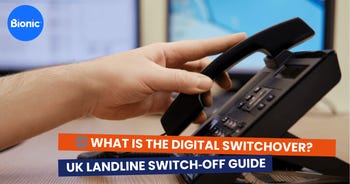Business broadband deals vs home broadband
In a world that’s more connected than ever, working from home should be a breeze.
Whether you run a business from your home or just work from home regularly, you might be tempted to stick with your standard domestic broadband. But there is a big difference between business and residential internet, and having the wrong kind of broadband could be bad for business.
For instance, your connection might not be fast or reliable enough to cope with the demands of commercial use. If so, it might be that investing a bit extra in business broadband is a price worth paying.
Here you will find out everything you need to know about business broadband and how to get the best bang for your buck.
Can I use home broadband for my business?
There’s nothing stopping you from using home broadband for your small business. But some SMEs find using home broadband a frustrating experience.
That’s because business broadband deals offer a separate line that ensures you have enough bandwidth to meet the day-to-day demands of doing business from home. This means you won't have to worry about anyone else in the house slowing down your speeds with online gaming or anything else that could leave you suffering with buffering on your Teams or Zoom calls.
Although not technically faster - both home and business broadband runs off same technology and network - having a dedicated line will make sure your connection always offers the speeds and reliability you need. Given that a small business is likely to place greater strain on your broadband, it makes sense to have a faster, more secure connection. This is also a more cost-effective option than having a dedicated leased line.
Even if your residential connection is good enough to handle the work you do, whether or not it’s the most tax-efficient way for you to access broadband is another matter.
Business broadband is tax-deductible as an expense, but it’s not so simple when you have a domestic connection. That’s because it’s hard to distinguish between business and personal use with a home broadband connection. So, not only is business broadband a great upgrade if your operations require speedy, reliable internet connection, but you can also offset it against your tax bill.
For your small business, getting a business broadband connection could mean you spend money that would otherwise be going to HMRC anyway, while also getting a faster, more robust service.
What’s the difference between business and residential internet broadband?
Business broadband is usually more expensive than standard home broadband, but there are also many advantages that come with a bigger price tag. Below are some of the most important:
Greater customisation
Different businesses have different needs, and often need support in building the right package for them, which could include bespoke calls packages, multiple lines, static IP addresses, guest WiFi or even a more catchy phone number. This level of customisation isn't generally available with domestic packages, so getting a business package will help make sure you have everything your business needs to stay connected.
Better business customer service and support
As a rule, business broadband deals will include a much higher level of customer support than their domestic equivalents.
Most business grade broadband providers will guarantee any problems are fixed within 24 hours, and many will act even quicker than that. The more expensive the package you opt for, the faster you are likely to receive support. With downtime costing some small businesses vital revenue, this is a big selling point when it comes to choosing business broadband.
Faster broadband speeds
Business broadband deals normally offer much higher speeds than home broadband. In the UK, the average broadband speed is 16Mbps, but business packages tend to be much faster, with fibre optic broadband speeds of up to 76Mbps.
With business broadband, providers prioritise your connection over domestic customers. That means you won’t experience bandwidth issues at peak times, which you may be familiar with from home use.
If you are a small business, a fast internet connection is an important tool to help you compete with your rivals.
Static IP addresses
A static IP address allows you to host a server and website, something which many small businesses need to do. It will also make it easy for you to access your business devices remotely.
Most home broadband providers only offer dynamic IP addresses (addresses which change every time you log on), but the majority of business broadband packages include a static address.
Service guarantee and compensation
Receiving better customer service from business broadband providers also means you’ll often be offered service guarantees and compensation.
What this means in practice is that providers will guarantee getting you back online within a certain timeframe if you experience any disruption to your service. Many providers will also offer compensation if they fail to make good on this promise.
While some home broadband providers come with similar guarantees, these are much rarer.
Improved cyber security
Most business broadband deals will include a cyber security package far in advance of what is offered by domestic broadband packages. Typically, a business package will include anti-virus, anti-spyware and firewall software, protecting you, your business and your clients from cyber attacks.
A better business broadband router
A good router is essential for having a reliable broadband connection. And a business broadband router is far superior to the domestic alternative.
Business routers are more powerful, cover a larger area and tend to have better built-in security than the router you would use for your home broadband.
Getting a better router is a big reason why it may be smarter to opt for a business broadband deal, especially if your small business operates multiple devices or does business from a large or multistorey premises.
Improved business phone services
Most residential broadband deals come with a standard single phone line as part of the package. But business phone lines and broadband packages are much more sophisticated.
You could get a relatively cheap phone and broadband package for your small business, similar to a home package. Or you could add extras tailored to your business, such as additional lines and non-geographic phone numbers. Some packages also provide business VoIP. These Voice over Internet Protocol (VoIP) services allow you to make business calls using the internet, as you’d do with Skype or Zoom.
All in all, a business broadband package not only provides better internet, but also a more flexible and bespoke phone service.
Why is business broadband more expensive than home broadband?
Unfortunately, business broadband is generally more expensive than home broadband. But for an internet-based small business with ambition to grow, it is highly likely that it will be worth it in the long run.
For the extra money, you will get a better service, faster connection, increased security, and a router that can handle more devices. Added together, that equals more peace of mind for you as a business owner.
Can I claim broadband as a business expense?
The other advantage of business broadband is that you can claim it as an expense. Yes, it may be possible to claim broadband as a business expense if you are using a home connection, but our experience suggests that it could be harder to do so.
Can you get business broadband if you work from home?
Yes, you can get business broadband if you work from home but you might not need it. Your own broadband might be fast enough to support your working day activities.
Since the pandemic, working remotely has become common. So, if you're running a business from your home or are a sole trader, you can find a deal from a business broadband provider. Make sure to compare tariffs to get the best deal.
You could benefit from upgrading to business broadband if:
- You need a static IP address
- You need faster upload or download speeds
- You need better levels of security
- You have equipment that requires more powerful hardware
- You need a reliable service for troubleshooting and customer service
What internet speed is required for working from home?
Ideally, when you're working from home, you'll want at least 10 Mbps of download speed and 1 Mbps of upload speed of internet bandwidth per person working from home.
But it really depends on what you're using your internet for. If you have powerful equipment or business programmes then you will likely need a faster internet speed.
How to find the right business broadband package with Bionic
There are nearly as many business broadband deals as there are types of business. So finding the right small business broadband for you can be a daunting task.
That is where Bionic comes in. Our team of experts, aided and abetted by our smart technology, will scour the market until we find the perfect deal to match your unique business needs.
All you need to do today is get in touch with us with your business details and we will do the rest.
Want to level up your business broadband and phone packages? Check out how we can save you money on even more business connectivity solutions.








